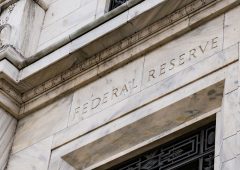U.S. Producer Price Index Rises 0.4% in November, Marking Strong Annual Increase
12.12.2024 15:42 1 min. read Alexander Stefanov
The U.S. Producer Price Index (PPI) for final demand increased by 0.4% in November, following a 0.3% rise in October and a 0.2% increase in September, according to the U.S. Bureau of Labor Statistics.
Over the 12 months ending in November, the PPI rose 3.0%, marking the largest annual gain since February 2023, when it reached 4.7%.
The November increase in final demand prices was primarily driven by a 0.7% rise in goods prices, which accounted for nearly 60% of the overall increase. The services sector saw a more modest 0.2% increase.
Within goods, the 0.7% rise was the largest since February, with notable gains across a range of sectors. In services, the 0.2% increase marked the fourth consecutive monthly rise, with trade services contributing significantly, up by 0.8%. However, transportation and warehousing services saw a decline of 0.5%.
Excluding food, energy, and trade services, the core PPI rose 0.1% in November, following a 0.3% increase in October. On a year-over-year basis, the core PPI rose 3.5%.
Unemployment claims for the week also saw a higher-than-expected figure, with 242,000 new claims compared to the expected 221,000. Bitcoin’s immediate response to the PPI and unemployment data followed the market’s assessment of these inflationary signals.
-
1
U.S. PCE Inflation Rises for First Time Since February, Fed Rate Cut Likely Delayed
27.06.2025 18:00 1 min. read -
2
Key U.S. Economic Events to Watch Next Week
06.07.2025 19:00 2 min. read -
3
Gold Beats U.S. Stock Market Over 25 Years, Even With Dividends Included
13.07.2025 15:00 1 min. read -
4
U.S. Announces Sweeping New Tariffs on 30+ Countries
12.07.2025 16:30 2 min. read -
5
US Inflation Heats Up in June, Fueling Uncertainty Around Fed Cuts
15.07.2025 16:15 2 min. read
US Inflation Heats Up in June, Fueling Uncertainty Around Fed Cuts
U.S. inflation accelerated in June, dealing a potential setback to expectations of imminent Federal Reserve rate cuts.
Gold Beats U.S. Stock Market Over 25 Years, Even With Dividends Included
In a surprising long-term performance shift, gold has officially outpaced the U.S. stock market over the past 25 years—dividends included.
U.S. Announces Sweeping New Tariffs on 30+ Countries
The United States has rolled out a broad set of new import tariffs this week, targeting over 30 countries and economic blocs in a sharp escalation of its trade protection measures, according to list from WatcherGuru.
Key U.S. Economic Events to Watch Next Week
After a week of record-setting gains in U.S. markets, investors are shifting focus to a quieter yet crucial stretch of macroeconomic developments.
-
1
U.S. PCE Inflation Rises for First Time Since February, Fed Rate Cut Likely Delayed
27.06.2025 18:00 1 min. read -
2
Key U.S. Economic Events to Watch Next Week
06.07.2025 19:00 2 min. read -
3
Gold Beats U.S. Stock Market Over 25 Years, Even With Dividends Included
13.07.2025 15:00 1 min. read -
4
U.S. Announces Sweeping New Tariffs on 30+ Countries
12.07.2025 16:30 2 min. read -
5
US Inflation Heats Up in June, Fueling Uncertainty Around Fed Cuts
15.07.2025 16:15 2 min. read


